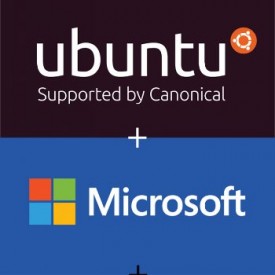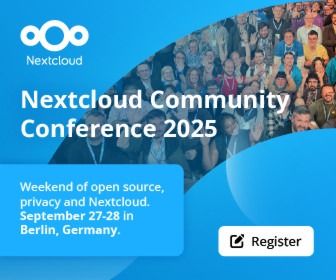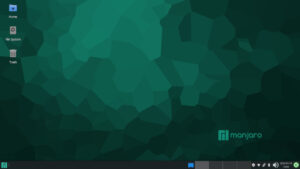FOSS Week in Review

Grab some popcorn — make two bowls — and get comfortable.
Call it Canonisoft: A while back I was fitted for a tinfoil hat by some because I had the audacity — the audacity! — to suggest that it would be a shrewd business move by the now-Linux-loving Microsoft to buy Canonical because a.) Canonical had technology that Microsoft would want and need to advance in mobile (like the Ubuntu Phone technology, which blows Microsoft’s out of the water currently), and b.) by this time, Mark Shuttleworth is beyond tired of flushing millions after millions down the toilet (though, as a half-billionaire, he still has several decades of current spending before his bank account resembles, well, mine), and who can blame him?
You laughed. Well, sports fans, allow me to hand back your tinfoil hat and ask, who’s laughing now? Linux Journal’s James Darvell outlines this scenario in great detail, quoting a blog item reporting the business deal, and makes an observation worth keeping an eye on: “Microsoft could convert Canonical into a very profitable acquisition by eliminating the unprofitable parts of the company,” he writes. “In fact, it could become the dominant player in the cloud space, and secure the company’s future.”
So what will it be, Mark?
Departures: By now most of you have heard about Sarah Sharp’s departure from Linux kernel development, which she outlines on her blog.
“Here’s the deal: I’m not a Linux kernel developer any more. I quietly transferred the maintainership of the USB 3.0 host controller driver in May 2014. In January 2015, I stepped down from being the Linux kernel coordinator for the FOSS Outreach Program for Women (OPW), and moved up to help coordinate the overall Outreachy program. As of December 6, 2014, I gave what I hope is my last presentation on Linux kernel development. I was asked to help coordinate the Linux Plumbers Conference in Seattle in August 2015, and I said no. My Linux Foundation Technical Advisory Board (TAB) term is soon over, and I will not be running for re-election.”
The blog item is worth a read, and it actually speaks volumes about the rampant douchebaggery in the upper echelons of Linuxdom.
But wait, there’s more — Matthew Garrett is out, too.
“In the end it’s a mixture of just being tired of dealing with the crap associated with Linux development and realizing that by continuing to put up with it I’m tacitly encouraging its continuation, but I can’t be bothered any more. And, thanks to the magic of free software, it turns out that I can avoid putting up with the bullshit in the kernel community and get to work on the things I’m interested in doing.”
Okay, that’s two. You know things like this usually happen in threes, right?
Well, here’s the third, though it’s completely unrelated to Sharp and Garrett: The call went out in September for nominations for the Ubuntu Community Council elections, and they were returned with a glaring omission: Elizabeth Krumbach Joseph, who will not be running for re-election. She explains in her blog her motivations for moving on, and it’s well worth a read. Perhaps this is understatement, but her absence leaves a notable void in the “adult-in-the-room” department, since Elizabeth was often the voice of reason and sanity — and of course a voice for doing the right thing even when it was unpleasant or difficult for Canonical/Ubuntu — in a UCC group too full of yes-boys and Ubuntu Apocalypse zombies. Her leadership will definitely be missed.
And…I’m out of popcorn. See you Monday.
Help keep FOSS Force strong. If you like this article, become a subscriber.










Matthew Garrett complains about Linus’ reaction to his plan to add a Microsoft signing certificate to the kernel. Linus was right and his characterization was not of Garrett personally, but of Red Hat. Garrett is just whining and if his other work is of the same dubious design quality as that, then no loss to the kernel.
Sara Sharp has used her share of foul language on the kernel mailing list too. Expecting it to contain only “professional” (a euphemism for politically correct) speech is just stupid. It is a tech community, not a corporate environment.
Mike Greger,
Sarah Sharp wasn’t objecting to the use of obscenities, she was objecting to the use of obscenities in insults at people. “This code is ____” is fine, “This ____ patch introduced four critical bugs” is fine. “Shut the ____ up” or “You are ____” is not fine. (I used the underscores because I don’t remember if FOSS Force has its policy on obscenities in the comments).
Any technical project lives or dies based on honest assessment of code. There’s no room for accepting bad patches or letting buggy code slip past to protect feelings. Sarah Sharp knows that. But insulting people doesn’t need to be part of the community. Tens of millions of lines of good code gets written in other projects every year without lead developers calling some of the other developers names you’ll hear in an elementary school playground.
I don’t see Microsoft buying Canonical.
First, Microsoft only supports Ubuntu on the Azure cloud because it would kill Azure adoption if they did not offer Linux. If Microsoft owned Ubuntu, it puts the company into conflict with itself – some Microsoft sales reps would be trying to sell Windows Server and Windows 10, others would be trying to sell Ubuntu Server and Ubuntu desktop. Since they charge money for Windows licenses and charge more than Canonical for support contracts, the Ubuntu sales would reduce profitability.
Second, the three biggest problems with Microsoft’s Windows Phone mobile operating system are not technical. The first problem is that Microsoft’s previous mobile operating systems were awful, so no matter how good Microsoft Windows Phone 7, 8, and 10 might be most of the people who would be first in line to buy a Microsoft product got burned in the past and went elsewhere. Second is that most smart phone shoppers already have Android or iOS devices and don’t want to switch. Third, Google has gone out of its way to break compatibility between Maps, Youtube, and Gmail with Windows Phone specifically to give Microsoft the finger after Microsoft’s shady “Scroogled” marketing campaign.
Mike S.
Referring to how she thinks speech on lkml should be, Sarah used the term “professional” multiple times, implying politically correct, corporate friendly speech. I disagree with that vehemently.
Even if she didn’t mean that, I’d still disagree. Not because I think insulting people is OK, but because I think she is overstating the occurrence of such things. I’ve seen a lot of Linus’ rants and rarely are they personal insults. Mostly they are about code, not the person committing it. When he veers into addressing an individual, it’s usually because the individual isn’t listening to what Linus has already tried to tell them. I see nothing wrong with that. In fact Sarah’s first public rant I am aware of on the lkml was inserted into a conversation that was clearly and obviously tongue-in-cheek humor.
It takes all kinds of people to make a world. Some are better at some types of things than others. Those who are better at some things can be hopeless in some other aspects of life.
Have you heard about the stereotype engineer? Great technical skills but horrid social skills. I remember reading in Anne Landers (a newspaper advice column from way back) that came from the wife of an engineer who said it is true with her husband, but he is still a great husband and good father but yes sometimes you could just _________.
I remember an engineer who said he has a great engineer working for him, he is the best he has ever seen. But he won’t let him within ten miles of a client.
Do you catch my drift here? There is a drift to catch, not an absolute. Yes some people need to be lectured in proper behaviour from time to time and it will happen with people who have high technical skills, all because that which can make them good at one thing, leaves them typically deficient at others.
It is not a Linux problem. It is a people problem that we all have to come to grips with.
Microsoft and Canonisoft get in bet together? Perfect, a match
made in heaven.
New corporation will be formed.
New name: FLACCID
I think that most of what Linus does is amazing. I’m glad he offends people. A lot of the time people are just plain stupid and need to be told not to be so stupid. We live in a pathetic world anymore. People are too fragile and need a good shaking to wake the frig up. Linus is a born/natural leader. If you look at the examples, GNU was started by RMS… it didn’t go much of anywhere until Linus said he was going to make an OS… then POOF! The world has an open source OS. The GNU projects were forked and now Linux exists. I don’t think GNU would have gone anywhere, because RMS isn’t someone that people want to follow. Same with git! People all over the world were using a ton of different ways to track code… now almost everything is git-based. Linus has a gift. He has followers. Anyone with this kind of gift is going to have dislikes as well.
@Cory Hillard
A nitpick – the GNU projects weren’t forked. GCC, glibc, and other GNU software make up nearly as much of many Linux-based operating systems as the kernel does.
Take Debian for instance. You can run Debian with the Linux kernel, the kFreeBSD kernel, or even the GNU Hurd kernel.
I do agree Torvalds is a better leader than Stallman, although I am closer aligned with Stallman’s goals than Torvald’s.
Agreed it is a nitpick. My point is, GNU was started, and the idea of another free operating system (by Linus) was announced. It is headed up, maintained and governed (for the most part) by Linus. The name Linux was chosen, and this project had nothing to do with GNU. It is a different path, different money, different in so many other ways (even as you said) different goals. These goals have nothing to do with GNU or the Free Software Foundation. They are the goals of Linux. The thing that bothers me the most about RMS/FSF/GNU is that there was a completely separate idea to create a new OS, one for which Linus has specific ideas and goals for. Yet, because he used some of the “free” software that is being maintained by GNU, and rightfully so, it is good software and supposed to be free. Free to fork, free to change, free to use… except if you are doing something similar with it like building an OS, then RMS rips away your freedoms and demands everyone call your project GNU. Which he himself says is NOT part of his goals or vision. Where is the freedom that he preaches about? Where is the freedom in any of it. I can fork an entire Linux OK and nobody would demand I call it Fedora/CoryOS or demaind I say Debian/CoryOS. Unless it’s RMS, then his friggin face is right there saying you have to name it after GNU! Free software is either FREE or it’s not. I want to continue ranting about this, but I think my point is clear by now.
@Cory Hillard
RMS calls it GNU/Linux. He prefers other people do as well to give credit to the amount of work that went into it. How is that IN ANY WAY taking your freedom away? You can call it it anything you like.
Heck, even Linus has said that calling distros with the GNU userland GNU/Linux makes sense. He said referring to all Linux as GNU/Linux makes no sense and RMS agrees with him on that, specifically with regard to Android.
Demonizing RMS is pointless and unwarranted.
Incidentally Linux is not an operating system – it never was. It is a kernel used in a huge variety of DIFFERENT operating systems, some with a lot in common, e.g. GNU, and some with little to none, like Android.
Linus Torvalds intent was to create an operating system. That’s exactly what he said he was going to do. What ended up happening is he got stuck in the Kernel phase because that single project became the biggest collaborative software project in the world. It needs a maintainer. Linus does a great job doing that. Again, intent and goals… Linus wanted to create an OS.
Here’s the thing that RMS is awesome at. He created the ability to leapfrog software technology. We no longer have to reinvent the wheel. I can take someone else’s wheel and make a car out of it. …or even another wheel. If I want to take any GPL code, and make, transform, recreate, fix, debug… whatever I want… I can do. But for RMS to suggest I call anything I do, or redo, or create using free software “GNU”, is NOT freedom. It is MY project. It is my direction. It is my desires.
What he seems to forget is that was his entire goal. His vision is being fulfilled. However, the popularity of Linux has made him lose focus. He at times is even a prick about it. Instead of being happy about his ultimate vision being fulfilled he seems to be jealous of the popularity of Linux. I don’t demonize RMS, he does that himself when he gets up on stage 100% of the time and acts like a child. He loses his hero status and people just see him as a dick.
One day I hope to create software under the GPL, for everyone to use. Free. I want to know that whatever I create is free and no limits are forced on me. I want to know that if I create something, RMS isn’t going to get on a stage and belittle my work and claim my vision is his and that he got there first. If you can’t see that he does that, then you haven’t watch with clear eyes.
I certainly don’t agree with everything that RMS says. However, he doesn’t demand that any project name themselves anything. I’ve never heard of him asking any project to put GNU in its name. He certainly never implied that the Linux project (the kernel) should use the name GNU.
What RMS actually wants is for people to use the GNU name when making references to the general operating system that is based on the Linux kernel and the GNU user space. I’m sure he’d like the projects that use this operating system and use the name “Linux” in their project name to also use the name “GNU” (like Debian does), but I’ve never heard him demand such a thing of any particular project. Even then, a lot of projects don’t officially have “Linux” in their project names (Ubuntu, Fedora, Mageia, etc.). RMS wouldn’t expect these projects to start using “GNU” in their names.
Of course, RMS doesn’t seem to understand the nature of people. He wants people to care about the origins of the project, and it’s great to educate them about that. However, people tend to abbreviate names, and they’re never going to regularly use a term as unwieldy as “GNU/Linux.” They shorten it to “Linux” since that it easier.
I’ve never been one to use the term “GNU/Linux” when I was talking about the operating system generally referred to as “Linux.” However, since the advent of Android, another operating system using the Linux kernel, I’ve found myself using the term in certain discussions in order to clearly distinguish between the kernel, the operating system, and the other operating system, Android, by using the terms “Linux,” “GNU/Linux,” and “Android.”
I’m certainly not saying that RMS is never a jerk about this, as pedants often are. However, he doesn’t have a monopoly on being a jerk. Linus Torvalds is sometiems a jerk too, just about different types of things.